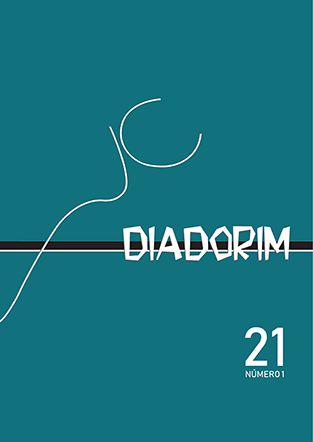Luiz Gama: the irreverence of the Lira and the Marimba of an Orpheus of “Carapinha” in the Second Reign
DOI:
https://doi.org/10.35520/diadorim.2019.v21n1a22632Keywords:
Afro-Brazilian literature, history of literature, literature and history, literary criticism.Abstract
z Gonzaga Pinto da Gama, or rather, Luiz Gama (1830-1882), had a life marked by the hardships which had fallen upon the black Brazilian people throughout three centuries having the worsening factor of having been born free and around ten years of age being sold by his own father. The father’s doings were reversed due to Luiz’s being mutinous which not only did it make him get his freedom back, but also fight for the other black people to conquer it as well. His doings regarding the legal field were related to Literature through the launching of “Primeiras trovas burlescas de Getulino” (1859), where are found poetry in which he probes slavery in the 19th century, appealing to corrosive irreverence to show the negative traits of the coffee producers elite. After a lasting and underserved oblivion, Gama became subject of interest for researchers who have been showing his compositions worth, value of which are pointed by analyses that relate his work to the afro-Brazilian literature, exemplifying. Concomitantly, it is a relevant work to study satire in Brazilian literature, a way of expression usually denied. Nonetheless, it used to be recurrent at the time in which the poet was living. For this reason, this paper has as a goal to contextualize the satirical poetry of Luiz Gama, taking in consideration the irreverent way of questioning the reality in which he was inserted. Hence, it will be used principles of theoretical literature in confrontation with historiography and sociology studies.
References
CARVALHO, Marcus J. M. de. Cidades escravistas. In: SCWARCZ, Lilia Moritz; GOMES, (Org.). Dicionário da escravidão e liberdade. 50 textos críticos. 1ª. ed. São Paulo, 2018. p. 156-168.
Embaixada de Portugal. “Gabriela Amadeu (Brasil) vence 7ª edição do Prêmio de Dramaturgia António José da Silva”. Disponível em: http://www.embaixadadeportugal.org.br/noticias/noticia.php?cod_noticia=373 Acesso em: 01/12/2013.
FAUSTO, Boris. História concisa do Brasil. Colaboração de Sérgio Fausto. 3. ed. atualizada e ampliada. São Paulo: Edusp, 2015.
FERREIRA, Lígia Fonseca. “Luiz Gama por Luiz Gama: carta a Lúcio de Mendonça”. Disponível em: http://www.letras.ufmg.br/literafro/autores/28-critica-de-autores-masculinos/653-luiz-gama-por-luiz-gama-carta-a-lucio-de-mendonca-ligia-fonseca-ferreira Acesso em: 04/12/2018
Folha de São Paulo. “Jeferson De roda filme sobre Luiz Gama, ex-escravo que libertou 500 pessoas”. Disponível em: https://www1.folha.uol.com.br/ilustrada/2018/11/jeferson-de-roda-filme-sobre-luiz-gama-ex-escravo-que-libertou-500-pessoas.shtml Acesso em: 04/12/2018.
GAMA, Luiz. Carta a Lúcio de Mendonça. Disponível em: http://www.letras.ufmg.br/literafro/autores/11-textos-dos-autores/651-luiz-gama-sao-paulo-25-de-julho-de-1880 Acesso em: 08/12/2018.
Geledés: “Estreia do Espetáculo ‘Luiz Gama – Uma Voz pela liberdade’ no Rio de Janeiro”. Disponível em: https://www.geledes.org.br/estreia-do-espetaculo-luiz-gama-uma-voz-pela-liberdade-no-rio-de-janeiro/ Acesso em: 30/11/2018
HERNÁNDEZ, G. E. La satira chicana. México: Siglo Ventiuno, 1993.
Instituto dos Advogados do Brasil. Medalha Luiz Gama”. Disponível em: https://www.iabnacional.org.br/institucional/medalha-luiz-gama Acesso em: 01/12/2018
MARTINS, Heitor. “Luiz Gama e a consciência negra na literatura brasileira”. Salvador: Revista Afro-Ásia – Centro de Estudos Afro-Orientais da Universidade Federal da Bahia, nº 17, 1996.
Ministério da Cultura. “Prêmio Luso-Brasileiro de Dramaturgia Antônio José da Silva – Nota de esclarecimento”. Disponível em: http://www.cultura.gov.br/noticias-destaques/-/asset_publisher/OiKX3xlR9iTn/content/premio-luso-brasileiro-de-dramaturgia-antonio-jose-da-silva/10883 Acesso em: 01/12/2018
PEREIRA, Lúcia Miguel. Machado de Assis: estudo crítico e biográfico. Brasília. Senado Federal, 2017.
SCWARCZ, Lilia Moritz; GOMES, Flávio dos Santos. Introdução. In: ______ (Org.). Dicionário da escravidão e liberdade. 50 textos críticos. 1ª. ed. São Paulo, 2018.
_____ . As barbas do imperador: D. Pedro II, um monarca nos trópicos. 2. ed. 17ª. Reimpressão. São Paulo: Companhia das Letras, 2017.
Senado Notícias. “Leis sancionadas homenageiam abolicionista Luís Gama”. Disponível em: https://www12.senado.leg.br/noticias/materias/2018/01/17/leis-sancionadas-homenageiam-abolicionista-luis-gama Aceso em: 04/12/2018.
SOETHE, P. A. “Sobre a sátira: contribuições da teoria literária alemã na década de 60”. Fragmentos: Revista de língua e literatura estrangeira. (Universidade Federal de Santa Catarina) v. 7, n.2, 1998.
Downloads
Published
Issue
Section
License
Copyright transfer -- Authorization to publication
If the submitted article is approved for publication, it is already agreed that the author authorizes UFRJ to reproduce it and publish it in Diadorim: revista de estudos linguísticos e literários, the terms "reproduction" and "publication" being understood as defined respectively by items VI and I of article 5 of Law 9610/98. The article can be accessed both by the World Wide Web (WWW) and by the printed version, with free consultation and reproduction of a copy of the article for the own use of those who consult. This authorization of publication is not limited in time, and UFRJ is responsible for maintaining the identification of the author of the article.

The journal Diadorim: revista de estudos linguísticos e literários is licensed under a Creative Commons Attribuition-NonCommercial 4.0 International (CC BY-NC 4.0).

